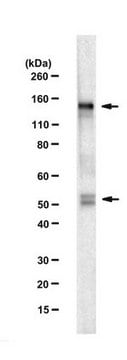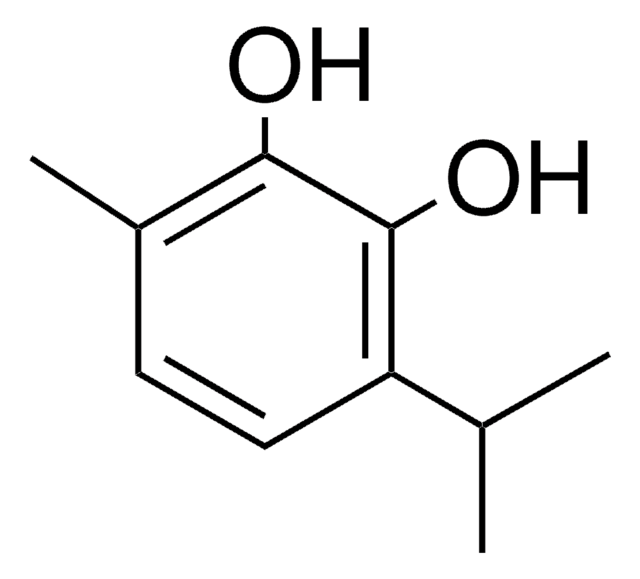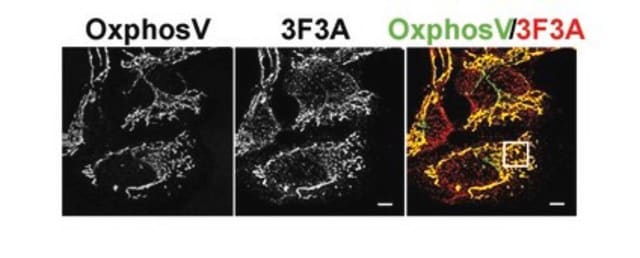推荐产品
生物源
rabbit
品質等級
抗體表格
unpurified
抗體產品種類
primary antibodies
無性繁殖
20B12, monoclonal
物種活性
human
物種活性(以同源性預測)
mouse (based on 100% sequence homology)
技術
western blot: suitable
同型
IgG
NCBI登錄號
UniProt登錄號
運輸包裝
ambient
目標翻譯後修改
unmodified
基因資訊
human ... SREBF1(6720)
一般說明
Sterol regulatory element-binding protein 1 (UniProt: Q9WTN3; also known as SREBP-1, Sterol regulatory element-binding transcription factor 1) is encoded by the Srebf1 (also known as Srebp1) gene (Gene ID: 20787) in murine species. SREBPs are a family of transcription factors that regulate lipid homeostasis by controlling the expression of a range of enzymes that are required for endogenous cholesterol, fatty acid, triacylglyceride, and phospholipid synthesis. The three SREBP isoforms known as, SREBP-1a, SREBP-1c, and SREBP-2, have different roles in lipid synthesis. It has been reported that SREBP-1c is mainly involved in fatty acid synthesis and insulin induced glucose metabolism. SREBP-2 is mainly involved in cholesterol synthesis. SREBP-1a isoform is reported to be involved in both of these pathways. Isoform SREBP-1A predominates in spleen, while isoform IC predominates in liver, adrenal gland, brain and adipose tissue and both IA and IC are found in kidney, thymus, testis, muscle, jejunum, and ileum. Expression of SREBP-1C in the liver is reported to be controlled in a circadian manner with a peak at ZT16. SREBPs are synthetized as inactive precursor proteins that are bound to the endoplasmic reticulum membranes and upon activation, the precursor is cleaved off in a two-step process to release the N-terminal active domain in the nucleus. Sterols are shown to inhibit the cleavage of the precursor protein and the mature nuclear form is rapidly catabolized, thereby reducing transcription. SREBP-1 binds to the sterol regulatory element-1 (SRE1 5′-ATCACCCCAC-3′), which flanks the low density lipoprotein receptor gene and some genes involved in sterol biosynthesis. Mice overexpressing processed isoform SREBP-1A in adipocytes show enlarged white and brown adipocytes, increased rate of fatty acid synthesis and secretion leading to a fatty liver. Mice lacking isoform SREBP-1C show a lack of up-regulation of several lipogenic enzymes in response to high insulin or LXR activation. (Ref.: Eberle, D et al. (2004) Biochimie 86(11); 839-48).
特異性
Clone 20B12 recognizes SREBP-1 in multiple human tissues.
免疫原
His-tagged recombinant fragment corresponding to 219 amino acids from the N-terminal region of murine sterol regulatory element-binding protein 1.
應用
Anti-SREBP-1, clone 20B12, Cat. No. MABS1987, a rabbit monoclonal antibody, detects SREBP-1 in human tissues by Western Blotting.
Research Category
Signaling
Signaling
Western Blotting Analysis: A 1:1,000 dilution from a representative lot detected SREBP-1 in 10 µg of HEK293 cell lysates.
品質
Evaluated by Western Blotting in HepG2 cell lysates.
Western Blotting Analysis: A 1:1,000 dilution of this antibody detected SREBP-1 in 10 µg of HepG2 cell lysates.
Western Blotting Analysis: A 1:1,000 dilution of this antibody detected SREBP-1 in 10 µg of HepG2 cell lysates.
標靶描述
~120 kDa observed; 120.54 kDa calculated. Uncharacterized bands may be observed in some lysate(s).
外觀
Unpurified
Format: Unpurified
Rabbit monoclonal antibody in cell culture supernatant without azide.
儲存和穩定性
Stable for 1 year at -20°C from date of receipt. Handling Recommendations: Upon receipt and prior to removing the cap, centrifuge the vial and gently mix the solution. Aliquot into microcentrifuge tubes and store at -20°C. Avoid repeated freeze/thaw cycles, which may damage IgG and affect product performance.
其他說明
Concentration: Please refer to lot specific datasheet.
免責聲明
Unless otherwise stated in our catalog or other company documentation accompanying the product(s), our products are intended for research use only and are not to be used for any other purpose, which includes but is not limited to, unauthorized commercial uses, in vitro diagnostic uses, ex vivo or in vivo therapeutic uses or any type of consumption or application to humans or animals.
未找到合适的产品?
试试我们的产品选型工具.
儲存類別代碼
10 - Combustible liquids
水污染物質分類(WGK)
WGK 2
MiSung Kim et al.
JCI insight, 2(24) (2017-12-22)
Increased sugar consumption is a risk factor for the metabolic syndrome including obesity, hypertriglyceridemia, insulin resistance, diabetes, and nonalcoholic fatty liver disease (NAFLD). Carbohydrate responsive element-binding protein (ChREBP) is a transcription factor that responds to sugar consumption to regulate adaptive
Kyounghee Min et al.
eLife, 12 (2024-04-02)
Circulating lactate is a fuel source for liver metabolism but may exacerbate metabolic diseases such as nonalcoholic steatohepatitis (NASH). Indeed, haploinsufficiency of lactate transporter monocarboxylate transporter 1 (MCT1) in mice reportedly promotes resistance to hepatic steatosis and inflammation. Here, we
Hong Lu et al.
Lipids in health and disease, 21(1), 46-46 (2022-05-26)
Hepatocyte nuclear factor 4α (HNF4α) and glucocorticoid receptor (GR), master regulators of liver metabolism, are down-regulated in fatty liver diseases. The present study aimed to elucidate the role of down-regulation of HNF4α and GR in fatty liver and hyperlipidemia. Adult
Junhee Park et al.
Nature communications, 13(1), 5594-5594 (2022-09-24)
Insulin receptor (IR) signaling defects cause a variety of metabolic diseases including diabetes. Moreover, inherited mutations of the IR cause severe insulin resistance, leading to early morbidity and mortality with limited therapeutic options. A previously reported selective IR agonist without
Antwi-Boasiako Oteng et al.
Molecular nutrition & food research, 63(19), e1900385-e1900385 (2019-07-22)
The mechanisms underlying the deleterious effects of trans fatty acids on plasma cholesterol and non-alcoholic fatty liver disease (NAFLD) are unclear. Here, the aim is to investigate the molecular mechanisms of action of industrial trans fatty acids. Hepa1-6 hepatoma cells
我们的科学家团队拥有各种研究领域经验,包括生命科学、材料科学、化学合成、色谱、分析及许多其他领域.
联系技术服务部门








